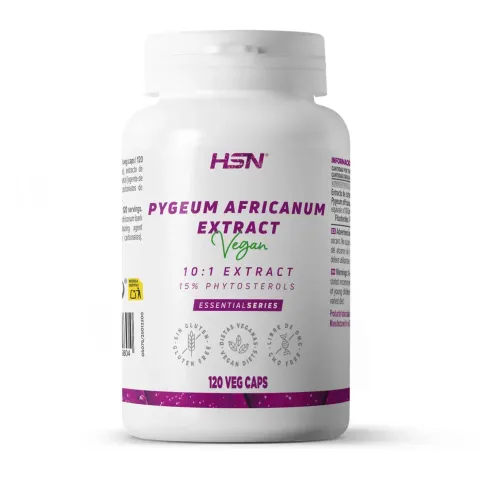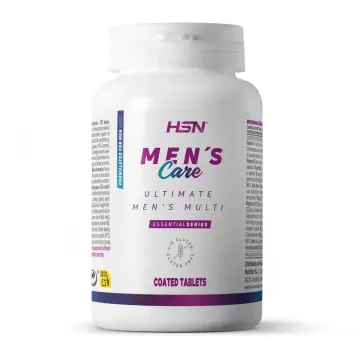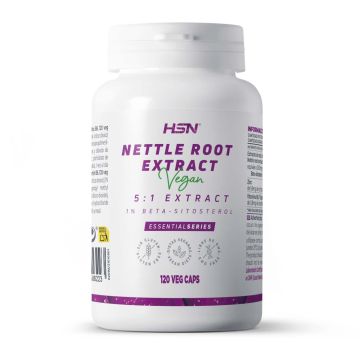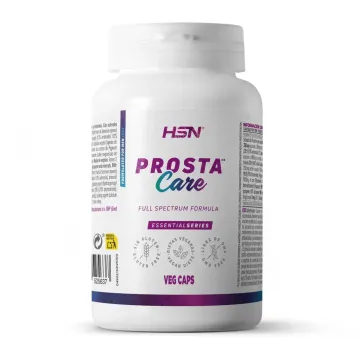- Pygeum africanum: A plant native to the African continent with significant modern-day use.
- Extract from the best part: HSN’s extract is made exclusively from the plant’s bark, the part richest in phytoactives.
- Standardised in phytosterols: The extract’s main chemical constituents, essential for all its properties.
- High guaranteed concentration: 10 times more concentrated extract. Extracted without the use of harsh solvents on the raw material.
- Clean formula: Produced without the use of additives for aesthetic reasons. Only what’s necessary to ensure top quality.
Pygeum Africanum – Discover the HSN extract
Pygeum Africanum Extract (10:1) 100mg from EssentialSeries is a food supplement made from Pygeum africanum.
HSN’s Pygeum africanum extract has been obtained exclusively from the bark of the plant, 10 times more concentrated than the native raw material using non-aggressive procedures, and standardised to 15% in plant sterols, its main compounds.
A top-quality extract for your daily care.
An ancestral plant with modern use
What is Pygeum africanum?
Pygeum africanum, also known as African plum tree, is a tree native to the mountainous regions of Central and Southern Africa. Its bark has been traditionally used in various African cultures, and is now valued for its bioactive compounds. These components have been scientifically studied in the context of plant-based functional properties, leading to the development of standardised concentrated extracts from Pygeum, like this one.
Pygeum africanum extract is generally intended for use by adult males, although its use by women is not limited or restricted, as it has no specific contraindications.
Why is the bark used?
The bark of Pygeum africanum is the part used to produce quality extracts, due to its high concentration of chemical compounds, notably phytosterols, which are especially valued for their functional relevance. These phytochemicals are part of the plant’s characteristic bioactive profile and are the main reason for the extract’s recognised value.
At HSN, we ensure the standardisation of our herbal extracts to guarantee their top quality. The 15% phytosterol standard in our extract ensures a high-quality composition, making sure that with the recommended daily dose you get a relevant amount of the key components behind Pygeum’s reputation.
HSN concentration and standardisation
Two key aspects to determine the quality of a herbal extract.
Our Pygeum extract has been 10 times more concentrated than the native bark, meaning each unit of extract equals 10 units of the original Pygeum bark, resulting in a significant efficiency gain—getting much more from much less.
Moreover, this isn’t just any bark, but a standardised selection with 15% phytosterols, with guaranteed content that ensures the extract is top-quality and maintains its functional properties in full.
Using Pygeum – Ideal for men
Pygeum africanum has a traditional use in various African cultures, especially in preparations aimed at men. This traditional use is the reason why today, food supplements made from the plant, like this one, are usually intended for a male audience, because:
- Supports normal urinary function in men.
- Helps promote urinary comfort in men.
However, this doesn’t necessarily restrict its use by women, as it has no contraindications or adverse effects specific to the female gender.
A clean label formula – Only the best
As part of our product development philosophy, we follow the motto: Keep it simple, deliver top quality.
In line with this, we produce our capsules free from endless lists of additives that serve no real purpose in the product. We don’t use colouring agents or capsule opacifiers. Our coating agents are transparent, a simple formulation ensuring that quality is focused on raw material selection and manufacturing guarantees.
Other products to use alongside Pygeum
Pygeum is used alongside many other products traditionally linked to male health.
Among the available options, one stands out: Saw Palmetto extract, considered the ideal complement to Pygeum africanum.
References
- Wilt, T., Ishani, A., Mac Donald, R., Rutks, I., & Stark, G. (2002). Pygeum africanum for benign prostatic hyperplasia. The Cochrane database of systematic reviews, 1998(1), CD001044.
- Cambronero, J., Osca-García, J. M., Merino-Salas, S., Miguel, J. M., Borralleras, C., & López-Alcina, E. (2022). Effectiveness of treatment with Pygeum africanum in patients with lower urinary tract symptoms and benign prostatic hyperplasia: a cross-sectional study in the real-world clinical practice in Spain (The PROFIT Study). Archivos españoles de urología, 75(3), 219–227
- Levin, R. M., & Das, A. K. (2000). A scientific basis for the therapeutic effects of Pygeum africanum and Serenoa repens. Urological Research, 28(3), 201–209.
 Before
Before After
After During
During Morning
Morning Afternoon
Afternoon Night
Night














